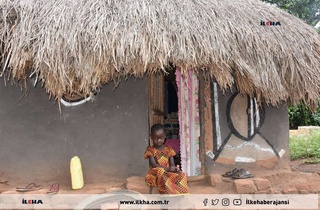The number of people on the brink of starvation across Africa’s Sahel region is ten times higher than it was in 2019, the World Food Programme (WFP) is warning, while the number of people who are displaced is up by 400 percent.
The combined effects of conflict, the COVID-19 pandemic, climate, and rising costs are putting basic meals out of reach for millions.
“An absolute crisis is unfolding before our eyes,” said WFP Executive Director David Beasley on a visit to Benin, having inspected WFP operations in Niger and Chad. “I’ve been talking with families who have been through more than you can possibly imagine. They have been chased from their homes by extremist groups, starved by drought and plunged into despair by COVID’s economic ripple effects.”
Beasley added: “We’re running out of money, and these people are running out of hope.”
The Sahel, which runs south of the Sahara Desert, encompassing Burkina Faso, Chad, Mali, Mauritania and Niger, is currently experiencing some of its driest conditions in years.
Hunger is expected to affect 10.5 million people this year, including more than a million teetering on the edge of starvation, in the five countries.
This is up from 3.6 million in 2019, including 141,000 people who were on the brink of starvation. The current crisis is expected to outpace previous years' due to compounding factors including insecurity, an increase in poverty due to the coronavirus pandemic, and dramatic increases in the cost of staple foods.
While needs are sky high, resourcing to support some of the most vulnerable people is at rock bottom, forcing WFP into the difficult position of having to take from people suffering hunger to feed those who are starving.
In Niger, for example, a shortage of funding means that WFP halving food rations.
WFP requires US$470 million for the next six months to continue operations in the Sahel where, despite a challenging security context, in 20201 it worked with humanitarian partners to maintain lifesaving support reaching 9.3 million people in the five countries.
WFP has also been implementing resilience programmes to help families thrive. In just three years to 2021, WFP and local communities turned 270,000 acres of barren fields in five countries into productive agricultural and pastoral land, changing the lives of more than 2.5 million people. This work showed how investing in resilience can pay dividends in peace and stability.
There are further glimmers of hope. In Benin, for instance, where the threat of conflict spilling across from neighboring Burkina Faso and Niger into areas in the north is a growing concern, the Government-funded school feeding programme jointly implemented by WFP provides a nutritious meal to 700,000 children. It has been vital in creating jobs and strengthening the local economy. (ILKHA)



 Güncel
Güncel
 Dünya
Dünya
 Güncel
Güncel
 Güncel
Güncel
 Dünya
Dünya
 Güncel
Güncel
 Dünya
Dünya
 Güncel
Güncel
 Ekonomi
Ekonomi
 Dünya
Dünya





